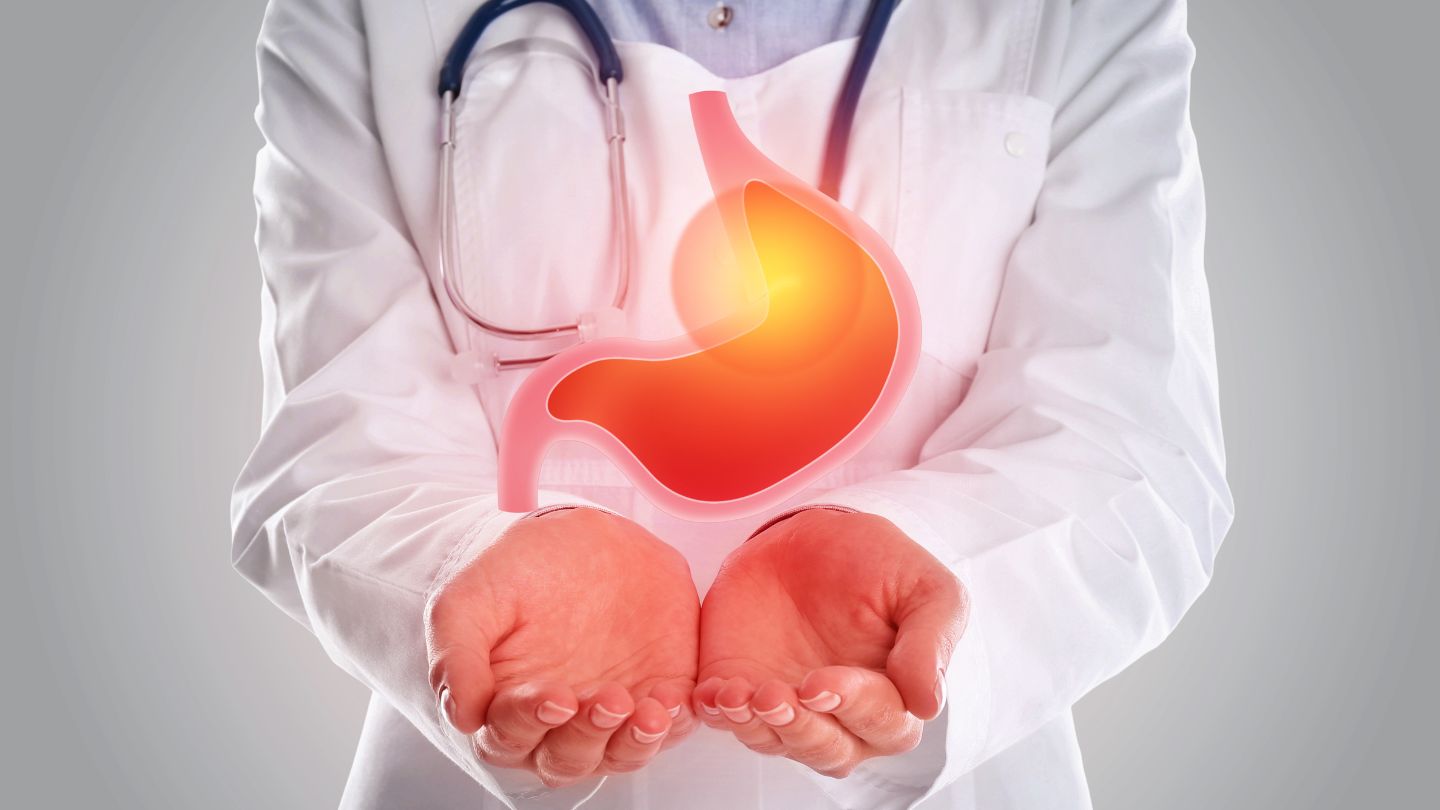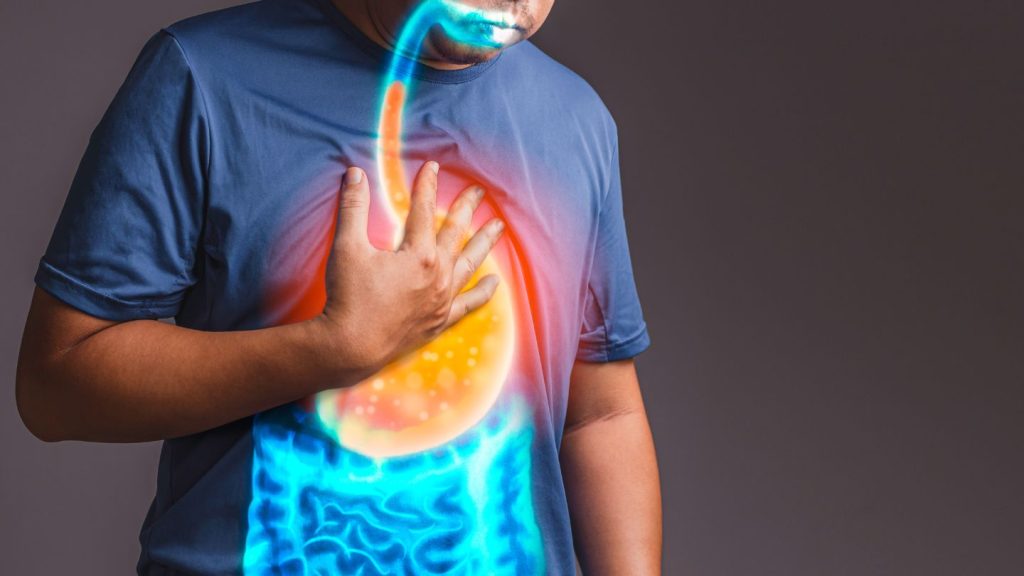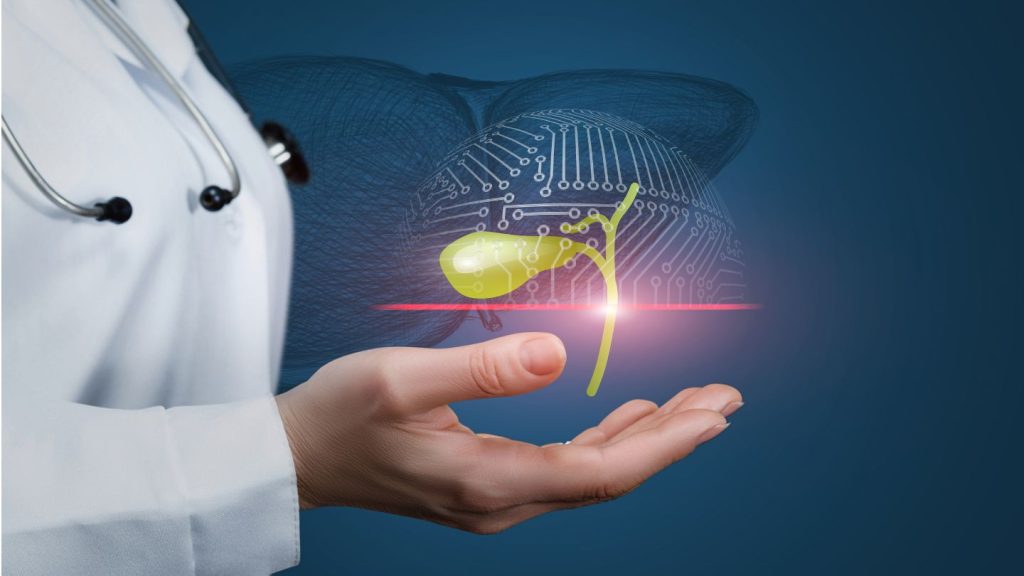
The Gallbladder and Acid Reflux Connection: Symptoms and Solutions
Acid reflux is a common digestive issue, but did you know your gallbladder could play a role in triggering symptoms? The connection between gallbladder health and acid reflux is often overlooked, yet understanding this link can be key to finding lasting relief. In this blog, we’ll explore how the gallbladder impacts digestion, the signs to watch for, and effective solutions to manage both gallbladder problems and acid reflux. Let’s dive in!
Key Takeaways
- The gallbladder stores bile, essential for fat digestion and toxin elimination; understanding its functions aids in identifying gallbladder-related symptoms.
- Gallstones can lead to inflammation and increased stomach acid production, contributing to acid reflux and bile reflux, exacerbated by dietary choices.
- Differentiating between gallbladder pain and acid reflux symptoms is crucial for effective treatment, as they manifest distinct pain locations, characteristics, and triggers.
Understanding the Gallbladder and Its Functions
Located in the upper right section of the abdomen, the gallbladder is a diminutive pouch that significantly contributes to digestion. It serves as a reservoir for bile, which is produced by the liver and plays an indispensable role in breaking down fatty substances while also facilitating detoxification by processing expended red blood cells and certain toxins.
Bile consists of components tailored to fat digestion. This digestive fluid gets released into the small intestine when we ingest foods rich in fats, assisting with their breakdown and assimilation. Although crucial to digestive processes, it’s worth noting that humans can function without their gallbladders.
Understanding how this organ operates enables one to pinpoint symptoms related specifically to disorders affecting it. This knowledge aids individuals not only in discerning issues like those associated with gallstone discomfort or a sudden onset of pain indicative of an attack but also highlights why seeking prompt medical intervention becomes necessary for mitigating health risks. Recognizing and diagnosing gallbladder diseases is crucial to prevent significant complications.
How Gallstones Influence Acid Reflux

Hardened deposits known as gallstones that accumulate in the gallbladder can have a profound effect on one’s digestive system, heightening the likelihood of experiencing acid reflux. When these stones incite inflammation within the gallbladder, there is an associated surge in stomach acid production, which, consequently, elevates the risk for acid reflux and its chronic manifestation of gastroesophageal reflux disease (GERD).
The situation worsens due to inflammation prompting bile to flow backward into both the esophagus and stomach. This leads to what’s termed bile reflux. To mitigate such symptoms effectively, it’s advised that individuals steer clear of foods rich in fat or high acidity levels or those with pungent flavors and avoid reclining immediately following meals.
Inflammation and Bile Backup
Gallstones can trigger inflammation that adversely impacts the digestive system. This inflammation of the gallbladder may lead to a gallbladder attack, characterized by intense pain in the upper right abdomen, which can radiate to the shoulder or back and may also include symptoms like fever and diarrhea. This inflammation may lead to a reverse flow of bile into both the stomach and esophagus, leading to substantial distress and multiple gastrointestinal symptoms. Bile reflux happens when there’s an issue with the pyloric valve—the gateway between the stomach and small intestine—either because it is too lax or blocked.
When this condition arises, bile—a digestive fluid created in the liver—backs up into one’s stomach, causing severe abdominal pain and leaving a bitter taste in the mouth.
Increased Stomach Pressure
The presence of gallstones can lead to an increase in pressure inside the stomach, which may exacerbate acid reflux symptoms. This added pressure has the potential to force stomach acid up into the esophagus, resulting in heartburn and additional signs of reflux.
When gallstones induce a buildup of pressure, it can result in severe abdominal pain and distress that is often characterized as a burning feeling within the chest area. These symptoms are especially prevalent after eating fatty or greasy foods that tend to aggravate them further.
Bile Reflux and Its Connection to Acid Reflux
Bile reflux and acid reflux are closely related conditions that can cause similar symptoms, yet they have distinct differences. Bile reflux occurs when bile, a digestive fluid produced by the liver, flows back into the stomach and sometimes into the esophagus. In contrast, acid reflux happens when stomach acid flows back up into the esophagus. Both conditions can lead to heartburn, regurgitation, and abdominal pain, but bile reflux can be more severe and cause more damage to the esophagus.
Bile reflux can be a complication of acid reflux, and sometimes bile is the primary irritant affecting the esophagus. The symptoms of bile reflux and acid reflux are similar, but bile reflux can cause a burning stomach ache, heartburn, sore throat, regurgitation of stomach contents into the esophagus, nausea, indigestion, and bile vomit. Understanding these symptoms can help identify the condition and seek appropriate treatment.
Differentiating Gallbladder Pain from Acid Reflux Symptoms
Differentiating the discomfort of acid reflux from gallbladder pain can be difficult since both conditions result in abdominal unease. Recognizing where the pain is situated and its distinct features Aids in pinpointing the precise problem.
Pain stemming from gallbladder issues tends to manifest in the upper right section of the abdomen and might spread to either the back or shoulder. In contrast, symptoms associated with acid reflux are felt at mid-chest level and have a tendency to travel up toward the throat. Discerning these variations is crucial for pursuing appropriate treatment and finding relief.
Pain Location and Characteristics
Pain originating from the gallbladder, commonly due to gallstones, is primarily experienced in the upper right section of the abdomen. It might also be perceived as general abdominal pain or discomfort that radiates toward the back and shoulder blades. The nature of this pain tends to be sharp and cramp-like, frequently provoked by consuming meals that are high in fat or grease.
On a different note, individuals who experience acid reflux typically suffer from a distinct burning sensation that intensifies around the chest area and may spread up toward the mouth and throat. This specific type of discomfort is widely referred to as heartburn – an indicator synonymous with acid reflux – which can lead patients to subsequently develop symptoms associated with this condition.
Triggers and Timing
The triggers and timing of pain can also help differentiate between gallbladder issues and acid reflux. Gallbladder pain, often caused by gallstones, typically occurs after eating fatty, fried, or greasy foods and can manifest immediately or a few hours after eating.
On the other hand, acid reflux pain usually occurs almost immediately after eating or after consuming specific foods. The symptoms can worsen if a person bends forward or lies flat after eating, further distinguishing it from gallbladder pain.
Diagnosing Gallbladder Disease and Acid Reflux
Diagnosing gallbladder disease and acid reflux can be challenging due to the overlapping symptoms. However, there are key differences that can aid in accurate diagnosis. Gallbladder disease often presents with upper abdominal pain, particularly in the upper right abdomen, while acid reflux typically causes chest pain. Additionally, gallbladder disease can lead to nausea and vomiting, whereas acid reflux usually results in regurgitation of food.
To diagnose gallbladder disease, doctors may perform imaging tests such as ultrasound or CT scans to detect gallstones or inflammation of the gallbladder. Blood tests may also be conducted to check for signs of infection or inflammation. For diagnosing acid reflux, an endoscopy may be performed to look for inflammation or damage to the esophagus, and a pH test can measure the acidity levels in the esophagus. Accurate diagnosis is crucial for effective treatment and management of these conditions.
When to Seek Medical Help for Gallbladder Issues and Acid Reflux

If you’re experiencing severe abdominal pain, nausea, vomiting, or unexplained weight loss that persists, it’s crucial to consult a healthcare provider. Pain originating from the gallbladder can be intense enough to disturb sleep, especially after eating fatty foods. Without proper attention and treatment, such issues may escalate into more serious complications.
Likewise, enduring symptoms of heartburn and other signs of acid reflux should not be overlooked. Should abdominal discomfort persist or intensify without improvement, immediate medical evaluation for potential conditions like a hiatal hernia is critical. In certain circumstances, surgery might be required to resolve these health concerns effectively.
Treatment Options for Gallbladder Disease and Acid Reflux
Depending on the severity and medical history of the patient, treatment methods for acid reflux and gallbladder disease differ. Tailoring to personal health requirements, these treatments can embrace both pharmacological and operative strategies.
For many patients, initial treatment typically involves medications coupled with adjustments in lifestyle habits. Should symptoms escalate to a more serious level, surgery might be imperative to mitigate discomfort and prevent additional health issues.
Medications and Lifestyle Changes
Medications are pivotal in controlling the symptoms linked to acid reflux and gallbladder complications. Mild acid reflux can often be managed with over-the-counter medications and lifestyle changes. For those who have small gallstones, healthcare providers may prescribe medications that dissolve cholesterol stones. Adopting a healthy lifestyle through a well-rounded diet and consistent exercise can aid in mitigating these symptoms.
To effectively manage the symptoms of both gallbladder issues and acid reflux, it’s important to pair prescribed medications with appropriate changes in lifestyle habits. Seeking advice from a healthcare provider is essential for pinpointing the right treatment strategy tailored to your needs.
Surgical Interventions
When medications and lifestyle changes are insufficient, surgical interventions may be necessary. Gallbladder polyps are one of the conditions that may necessitate gallbladder removal surgery. Gallbladder removal surgery, known as cholecystectomy, is a common procedure performed to alleviate pain and prevent the formation of future gallstones. This gallbladder surgery is typically performed laparoscopically with small incisions.
Post-surgery, bile is released directly into the small intestine, as the gallbladder is no longer present to store it. This can sometimes lead to bile reflux, which can be managed with medications like proton pump inhibitors (PPIs) and hydrotalcite to protect the gastric mucosa.
Read more: How Long Does it Take to Recover From Gallbladder Surgery?Complications of Untreated Gallbladder Disease and Acid Reflux
Untreated gallbladder disease and acid reflux can lead to serious complications. Gallbladder disease can result in infections, abscesses, perforations, and even gallbladder cancer. Acid reflux, if left untreated, can cause inflammation of the esophagus, scarring, and cellular changes to the lining, known as Barrett’s Esophagus, which can be a precursor to esophageal cancer.
Moreover, untreated gallbladder disease can cause bile reflux, leading to inflammation of the stomach lining (gastritis) and increasing the risk of stomach ulcers and stomach cancer. Acid reflux can also heighten the risk of esophageal cancer and other severe health issues. It’s essential to seek medical attention if you experience severe abdominal pain, vomiting, fever over 101.5°F (38.6°C), jaundice, or dark urine, especially if you have a history of gallstones or gallbladder disease. Early diagnosis and treatment can prevent complications and significantly improve quality of life.
Preventing Gallbladder and Acid Reflux Problems

Taking preventive actions can greatly lower the chances of developing gallbladder disease and experiencing acid reflux. Adding foods rich in fiber, like fruits, vegetables, and whole grains, to your diet is beneficial in averting the formation of gallstones. Choosing wholesome fats such as those found in olive oil, along with lean sources of protein, including chicken, turkey, and fish, may enhance the health of your gallbladder.
To ease abdominal pressure, which could potentially cause complications with both your gallbladder and reflux issues, it’s advisable to keep a healthy body weight and consume meals that are smaller in size. Before embarking on significant changes to one’s diet or aiming for quick weight loss that might raise the likelihood of forming gallstones, seeking guidance from a healthcare expert is suggested.
Understanding the Connection and Moving Forward
Gallbladder disease and GERD are closely intertwined, with shared symptoms and overlapping factors that can impact overall digestive health. Recognizing the connection between these conditions is key to managing symptoms effectively and preventing further complications. With proper medical guidance and lifestyle changes, both acid reflux and gallbladder issues can be better controlled, improving your overall quality of life.
At Wellstar Comprehensive Bariatric Services, we provide tailored care and support to help you achieve long-term health and relief from conditions like gallbladder disease and GERD. Our dedicated team provides personalized solutions for effective GERD and acid reflux treatment in Marietta and nearby areas, including Smyrna, Cobb, Austell, LaGrange, and West Georgia. We are committed to addressing your unique health needs with expert care and tailored treatment options. Take the first step toward better health today—contact us to learn more about how we can help you on your journey to wellness.
Frequently Asked Questions
Can problems with your gallbladder cause acid reflux?
Problems with your gallbladder can indeed lead to digestive issues, including acid reflux.
It is essential to address any gallbladder-related concerns promptly to avoid complications.
What are the common symptoms of gallbladder disease?
Common symptoms of gallbladder disease include severe abdominal pain, nausea, vomiting, and pain that may radiate to the back or shoulder.
It is important to seek medical attention if these symptoms occur.
How can I differentiate between gallbladder pain and acid reflux?
Recognizing the difference between pain from gallbladder issues and acid reflux can be discerned by where the discomfort is situated. Pain stemming from the gallbladder typically presents itself in the upper right section of the abdomen, potentially spreading to the back or shoulder area, while acid reflux commonly causes centrally located pain within the chest that can advance up toward your throat.
Grasping these nuances will assist you in pinpointing what might be causing your particular type of pain.
When should I seek medical help for acid reflux?
You should seek medical help for acid reflux if you experience persistent symptoms like chronic heartburn, unexplained weight loss, or severe abdominal pain.
Taking these indicators seriously is essential for your health.
What are the treatment options for gallbladder disease?
The primary treatment options for gallbladder disease are medications to dissolve gallstones, lifestyle modifications, and surgical procedures, such as cholecystectomy (gallbladder removal).
It is important to consult a healthcare professional to determine the most appropriate approach for your condition.
